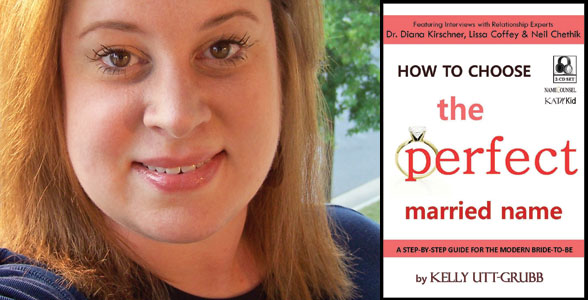From her home in Cary, North Carolina, Kelly Utt-Grubb runs a one-of-a-kind business. The UT psychology graduate (Knoxville ’05) is a family naming resource. That “huh?” that came to your mind is to be expected. She believes she’s the only person in the world in her chosen line of work. Utt-Grubb helps people with their last names, exploring, for instance, whether to keep them, change them, hyphenate them, or merge them with other names. She says those and other options should be explored to find a comfortable fit.
“Last names are closely tied to identity, and this issue is much more emotionally complicated than it appears on the surface,” she says. “People can and do just pick their own names, but many don’t realize all of their options, and many will regret their choices down the road if they aren’t careful about the decision to begin with.”
The hyphenated Utt-Grubb says she’s a perfect example. She took her husband’s name when they married in 1998. But by the time her first son was born, she thought better of it. “I decided to hyphenate my name and his,” she says. The arrival of a second son brought more change when Utt-Grubb’s husband, Sam, decided to adopt the hyphenated name, as well.
“He said that when he talked to our boys about things like equality and marriage being a partnership, he wanted those values reflected in his actions. I was impressed!”
Her personal experience led her to hang out her shingle as a family naming resource.
Utt-Grubb says people who seek her services usually are marrying or remarrying, preparing for a commitment ceremony or civil union, expecting or adopting a child, creating a blended family or a stepfamily, divorcing, or beginning again after the death of a spouse.
“Brides-to-be and expectant parents are my biggest client bases,” she says. “I help couples sort through the tough issues such as the nature of feminism and equality, the value of having a ‘team name,’ and perceptions of nontraditional choices.” The issues are many, she says–what your partner expects, how your choice will impact naming of children, how your career may be affected, how much you are influenced by societal norms and what others think, and whether or not your choice will reflect values that are important to you.
She gives an example of a client whose last name became problematic. Tammy Huber-Wilkins, a psychiatrist in Cincinnati, kept her maiden name when she married late in life, but 4 years later found herself using one of three variations depending on the situation she was in. Most of her friends and family called her Tammy Wilkins–her husband’s last name. Her medical school diploma read Tammy Huber, as did her medical license, but many of her patients called her Tammy Huber-Wilkins.
“When she contacted me, she was tired of having to stop and think about which name she should use in each situation,” Utt-Grubb says. “I helped Tammy sort through all of the meaning and associations she had with each variation of her last name and explore how her life experiences had shaped those associations.” The woman chose a hyphenated name and was so pleased with Utt-Grubb’s help that she allowed her story to be used on Utt-Grubb’s website, www.namecounsel.us.
A current case involves a man who is divorcing. When he and his wife married, they combined their last names to create a new one (such as Wilson and Field becoming Filson or Wield). The man built a successful career with the combined name and now is seeking Utt-Grubb’s help deciding whether to keep it or revert to his “maiden” name after the split.
Utt-Grubb recommends clients have “naming ceremonies” with family and friends to celebrate a new beginning or an addition to the family. Ceremonies can be formal or casual, but either way they affirm the new name and what it represents. Utt-Grubb also helps clients explore the impact of name changes on children and career and helps tie up the loose ends of a name change.
Most of her work is done at home by telephone, and she is also working on a book, The Name Change Revolution, a guide for people who are considering family naming options. She has produced a new two-CD set called How to Choose the Perfect Married Name: A Step-by-Step Guide for the Modern Bride-to-Be, and she’s been quoted recently in the Los Angeles Times, iParenting.com, and Pink magazine.
Utt-Grubb is originally from Youngstown, Ohio, but went to high school in Murfreesboro, Tennessee. She finished most of her UT courses (she says she uses her psychology training “every day”) in 2001 but didn’t receive a degree until 2005 after moving out of state for her husband’s job and having her second child.
There’s no right or wrong answer about names, Utt-Grubb says, “only a right and wrong answer for each individual.
“One thing is certain–last names have become a choice rather than a given,” she says. And even if you don’t particularly like your name, you can be comfortable with it.
“I spent so much time while I was engaged wishing that Sam and I had nicer sounding last names to work with, but by the time all four of us were officially Utt-Grubbs it felt just right for us. We decided on hyphenation because it meant embracing both ‘horrible names’ that I had spent so much time struggling with in the beginning.”



